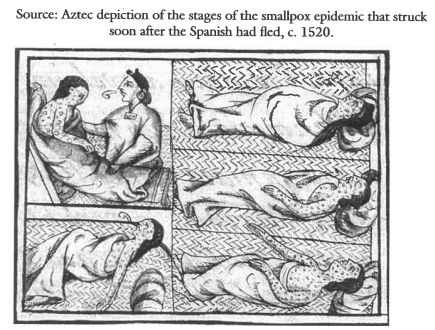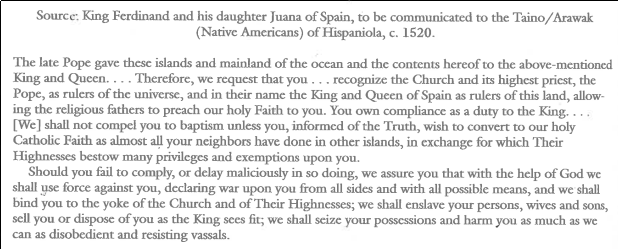Table of Contents
Exploration DBQ Notes
Requirements
- Do not restate the question
- Use a majority of the documents
- Show basic comprehension of each document
- Support the thesis with the aforementioned documents
- Analyze the documents and group them/compare them
- Account for author's bias and audience for each document
Prompt
Analyze the attitudes of European explorers toward Native Americans, and assess the impact that exploration had on the “New World”
Analysis
Document 1 and Document 2 directly show the conflict that appears early on between materialistic colonizers and religious officials on the treatment of the natives.
Document 2 and Document 3 directly display the brutality of the encomienda system and the ruthlessness of the Spanish colonizers.
Document 2 and Document 4 touch on smallpox.
Document 2 and Document 5 shows the flipside of the religious support, as it is clear that expanding Christianity (specifically Catholicism) is their ulterior motive.
Document 2 and Document 6 represent the “more accepting” side of the religious native-supporters.
Document 2, Document 5, Document 6, and Document 7, particularly their timelines, show the gradual shift in acceptance towards the natives.
Documents
Document 1
Tomorrow morning before we depart, I intend to land and see what can be found in the neighborhood. Here is no village, but farther within the island is one, where our Indians inform us we shall find the king, and that he has much gold. I shall penetrate so far as to reach the village and see or speak with the king, who, as they tell us, governs all these islands, and goes dressed, with a great deal of gold about him. I do not, however, give much credit to these accounts, as I understand the natives but imperfectly, and perceive them to be so poor that a trifling quantity of gold appears to them a great amount. This island appears to me to be a separate one from that of Saomete1), and I even think there may be others between them. I am not solicitous to examine particularly everything here, which indeed could not be done in fifty years, because my desire is to make all possible discoveries, and return to you Highnesses, if it please our Lord, in April. But in truth, should I meet with gold or spicies in great quantity, I shall remain till I collect as much as possible, and for this purpose I am proceeding solely in quest of them.
Christopher Columbus, journal extracts, written during his exploration of the area now known as the Bahamas, 1492.
Notes
- Columbus was sponsored by the Spanish royalty to explore a possible route to Asia.
- From first impression he views the natives as poor, and sees their wealth of gold as pity from the gods.
- His goal is to collect extreme amounts of spices and gold (luxuries), and return to Spain in April.
- This was written in his journal when he was exploring the Bahamas.
Document 2
On what authority have you waged a detestable war against these people, who dwelt quietly and peacefully on their own land? Why do you keep them so oppressed and weary, not giving them enough to eat, not taking care of them in their illness? For with the excessive work you demand of them they fall ill and die, or rather you kill them with your desire to extract and acquire gold every day. And what care do you take that they should be instructed in religion? Are these not men? Have they not rational souls? Are you not bound to love them as you love yourself?
Antonio de Montesinos, Dominican friar, The Sermon, criticizing the Spanish colonists who had enslaved the people of the Caribbean, 1511.
Notes
- Antonio Montesino was one of the first to openly denounce the enslavement of the natives by the Spanish.
- The treatment he is referring to is the encomienda system, which rewarded colonizers for enslaving non-Christians.
- Slaves under the encomienda system were subject to hard labor, with severe corporal punishment and possible death acting as the motivator.
- The “illness” refers to smallpox, which devastated the native populations in the New World as they didn't have the immunity of the European colonizers.
- He argues that they should be treated like men and brothers as referenced in Matthew 22:39, implying that their current treatment is that of inhuman objects for material gain.
- Also reaffirms that this was for God, Glory, and Gold.
- Finally, note the time between Columbus' exploration and the exploitation of the natives, only $1511 - 1492 = 19 \text{ years}$!
Document 3
On the day that Tenochtitlán was taken, the Spaniards committed some of the most brutal acts ever inflicted upon the unfortunate people of this land. The cries of the helpless women and children were heart-rending. The Tlaxcaltecas and the other enemies of the Aztecs revenged themselves pitilessly for old offenses and robbed them of everything they could find. Only prince Ixtlilxóchitl of Texcoco, ally of Cortés, felt compassion fro the Aztecs, because they were of his own homeland. He kept his followers from maltreating the women and children as cruelly as did Cortés and the Spaniards … The anguish and bewilderment of our foes was pitiful to see. The warriors gathers on the rooftops and stared at the ruins of their city in a dazed silence, and the women and children and old men were all weeping.
Fernando de Alva Ixtlilxóchitl, whose father was one of the native allies of Cortés, 1520.
Notes
- The Spanish had no morality when conquering.
- Even the native allies of the Spanish were disgusted,
- Cortés is the Spanish conqueror that fell the Aztec empire.
Document 4
Notes
- As stated in Document 2, smallpox devastated the native population, wiping almost 90% of the population
- Also, note the blankets
Document 5
Notes
- Religion played a large role in supporting the colonization of the new world, as it allowed the Catholic states to spread a religion that is being fought against in the Old World at the time.
- This is an illusion of free choice, as they are given a choice to baptism or not, but will be murdered and enslaved if they don't.
- Also note that this would be spoken to the natives in Spanish, which means that they were given a false ultimatum in a gibberish language. The natives basically had no choice.
Document 6
Notes
Finally, let all savagery and apparatus of war, which are better suited to Muslims than Christians, be done away with.KEKW Based and Christian-pilled.- The more accepting Europeans heavily valued religion and integration with Christianity to save the natives. Which kinda sucks if you don't want to be religious nor conquered/enslaved.
Document 7
Notes
- Probably the most “accepting” out of all the documents
- Written by a French Renaissance essayist.
- Though there is still ethnocentrism, he argues that they are the natural evolution of humans.
- Unknown if the above is an insult or not.
- Also, the document is named On Cannibals which is fucking hilarious.



